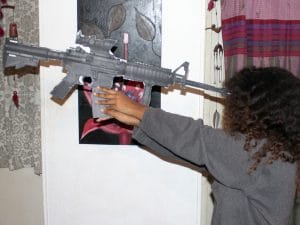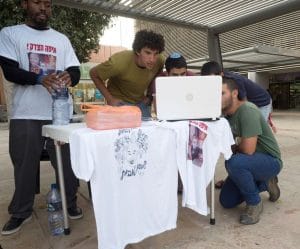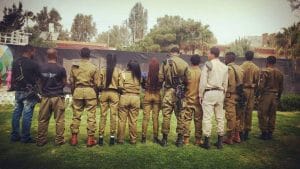IDF rules out foul play but family, friends and community refuse to believe Toveet Radcliffe committed suicide
by David Sheen
The largest intentional community in the African diaspora has launched a protest movement in recent weeks, seeking to learn the truth about the untimely demise of community member Toveet Radcliffe, the first African American to die while serving in the Israel Defense Forces. Rejecting the Israeli army’s ruling that no one other than the 19-year-old Radcliffe was involved in her own death, members of the African Hebrew Israelite community have launched a campaign to pressure the IDF to reopen the case.

Since mid-March, the central square of the southern Israeli town of Dimona, stronghold of the African Hebrew Israelite community, has seen regular demonstrations of support for Radcliffe. Operating a makeshift informational booth in front of Dimona’s City Hall, African Hebrew activists have been distributing information about Radcliffe’s life and death, collecting signatures for petitions in both Hebrew and English, and raising funds to pay lawyers to appeal the IDF decision to close its investigation.
In January, almost a full year after Radcliffe’s death, an IDF representative informed her family of the army’s decision to close the case. The army’s investigation materials arrived at the Radcliffe family home almost a full month later, leaving them with just five weeks to analyze the data and decide whether or not to appeal the closure of the case.
“What is unbelievable is, how does the army permit itself to tell a family in mourning, first, it took them 11 months just to inform them that she ‘committed suicide.’ All that time of uncertainty,” asks Dimona resident Shemohn Osher. Osher and his wife Khaya have spearheaded community efforts to raise awareness about the Radcliffe case – as well as the funds necessary to challenge the army’s decision to close it for good.
“And then from the moment they inform them that she ‘committed suicide,’ how do they permit themselves to come and say that within 30 days, the case will be closed permanently? That gives no respect to the family, no respect to a mother in mourning,” says Osher.
Funds raised by the Oshers and other community members have enabled them to retain the services of a lawyer who is now challenging the IDF decision to close the case. A Facebook campaign to raise awareness about the case has finally succeeded in sparking the interest of the Israeli mainstream media, who had previously ignored the incident for over a year.
Friends say Radcliffe was happy and confident
Born in Israel, Radcliffe was the daughter of African Americans who moved to Israel in order to join the African Hebrew Israelites, a close-knit spiritual community that practices an Afro-centric form of Old Testament worship. Radcliffe’s mother ended her official membership in the community a decade ago, and her father ultimately decided to leave Israel altogether, returning to live in the United States.
After spending her junior high school years in the U.S., Toveet returned with her mother and her three younger siblings to the southern Israeli city of Dimona, where African Hebrews make up about 10 percent of the population. Entering high school, Radcliffe quickly re-established old ties and formed new friendships.
Toveet was “the most beautiful person in the world – a person that you meet, and if you had a sad day, you smile right away,” according to her close friend Lior (not her real name). “She had an aura around her, you know? And you could see it on her. She always smiled, helped people. And she really, really, really loved life.”

Toveet and Lior developed a strong bond over their mutual love for painting. “She would come over to my house and we would sit together and paint canvases. I would paint the people, and she would paint the scenery. Because I didn’t know how to paint trees, and she didn’t know how to paint people,” recalls Lior.
The two hatched plans to travel around the globe once Toveet finished her army service. “She always wanted to travel and visit every place in the world. And she wanted to bring everyone with her!” says Lior, noting that the two had started to save funds to purchase plane tickets. “She really wanted to fly to Thailand and New York,” Lior says.
The image of Toveet that emerges is of a confident young woman who was universally admired for her beauty and her gaiety. Another close friend, Midiah Lacy, says that Toveet’s good looks and her joie de vivre endowed her with special privileges, which she used to her advantage, but was careful not to abuse. “Because Toveet had such a jolly-go-lucky spirit, Toveet could almost do anything,” says Lacy.
Like other Yahwist communities, the African Hebrew Israelites enforce a dress code that limits skin exposure, for reasons of modesty. But when Toveet attended the community’s largest annual festival, New World Passover, she wore an outfit that left her shoulders and her midriff exposed, in contravention of community norms. “She’s like, ‘Oh, they’re not going to say anything to me,’” says Lacy, laughing. “And they didn’t! She walked up there and she still looked like the sweetest thing, bouncing around in her little outfit.”
Though Toveet utilized her extraordinary beauty to access privileges that were denied to her peers, she was determined not to let it become a bulwark between her and her classmates, female or male. “You know pretty girls usually be acting like, ‘Oh, you? Mm-mm, no.’” Lacy shakes her head, as if casually dismissing a potential suitor. “And she was so pretty, so she didn’t want to give them the impression that you are not cute enough,” says Lacy. “She didn’t want them to have that feeling of not being good enough for her.”
African Hebrews now serve in the Israeli army
Toveet exuded a jovial spirit well beyond her social circles. “She didn’t really see a difference – [local Black] people, white people – she just saw a person,” says Lacy. Toveet’s universalist outlook also extended to Palestinians and other Arab peoples that the Israeli state has clashed with for decades. “She didn’t want no kind of war. She really wasn’t into politics, but she just wanted everybody to be happy with everybody. She didn’t want fights with Arabs, or fights with nobody. She just wanted everything to just be chilled out and everybody to be peaceful.”
Though she hoped to see peace, Toveet enlisted in the Israeli army with the rest of her African Hebrew peers. “The majority of us, we go in because we have to,” says Hodeyah Jackson, another of Toveet’s close friends. “We have a different mindset. We are not racist to Arabs; we do not hate Arabs.” But unlike the rest of their Israeli-born peers, African Hebrews do not receive Israeli citizenship at birth and are only eligible for it if they choose to serve in the Israeli army – what makes for a powerful incentive to enlist.

Jackson says that Toveet had hoped, perhaps naively, to spend her service working with animals, but ended up serving in an IDF combat unit, operating a battery of Patriot missiles to defend the state from incoming missile attacks. “They convinced her to go there; she didn’t want to. She had something else in mind,” says Jackson. “Then when she got there, [Toveet’s family] had money problems, so they started telling her a lot of things about how much money her family would get.”
In the Israeli army, combat soldiers receive higher salaries than non-combat soldiers. Though these sums are significantly less than minimum wage in the civilian sector, this difference proved to be the deciding factor for Toveet. With her father living in the United States and her mother only earning a small pension, she felt obligated to financially support her brothers and sisters, Jackson says. “She felt like she was the head of the family; that’s how it was.”
Army suicide theory #1: Poverty
Half of the Israeli army’s investigation materials consist of interviews with dozens of soldiers who had served with Radcliffe. They all told a similar story: Toveet was a happy young woman who could frequently be seen singing and dancing, including earlier on the very day she was shot. She was close to her family and friends and was making plans for the short-, medium- and long-term future.
If Toveet really planned to take her own life, it would mean that she diligently hid this intention from every person she ever came into contact with. Clearly, there are those who won’t wear their feelings on their sleeves, people who prefer to keep their darkest demons to themselves. Those who knew Toveet best say she was nothing like that.
“She got real. It wasn’t like she just pretended to be happy. She talked about things; she said stuff. It wasn’t like she would just shut down,” says Hodeyah Jackson. “If you didn’t see nothing, there was nothing. Because if there was something, you would see something; you would know.”
Despite the scant evidence to support it, the army investigation focused almost exclusively on the unlikely possibility that Toveet took her own life. The army posits two possible motives for her to have committed suicide: poverty and pimples.
Truly, the Radcliffes have struggled to make ends meet. Toveet’s father left the family for the United States years ago, and her mother Khydijah Gray managed to raise her four children with only a small disability income. When Toveet entered the army, she was still sharing a room, and even a bed, with her younger sister, M.

But being of limited means is not uncommon amongst African Hebrews, most of whom are based in Israel’s periphery, where gainful employment is hard to come by. “All of us come from poor families. I wouldn’t say too poor, but we don’t have a whole lot,” says Lacy.
If anything, her family’s financial straits were a reason for Toveet to have stayed alive, in order to help them out economically. “She cared so much about her brothers and sisters, so so much,” says Midiah Lacy. “She just really wanted to get them to a better place.”
With her mother mostly house-bound due to chronic back pain, Lacy says that Toveet saw herself as the primary breadwinner of the family. Asked what would need to occur to cause Toveet to take her own life, Lacy replies: “Her whole family would have to die, every last one of them. Because if one of them died, she would be there for the other ones. So unless her whole family died – never.”
Lior confirms Lacy’s impressions of Toveet. “There is no way that she committed suicide. No way in the world. No way.”
Army suicide theory #2: Pimples
The IDF investigation also assembled evidenced in support of another, even less believable, suicide theory: that Toveet chose to end her life because she was so distraught over a zit outbreak. Investigators latched onto a single note typed into Toveet’s phone six months before her death, in which she writes:
“One of the things about having SA is that I feel people often judge me. I know I shouldn’t flatter myself but every time I’m out inn [sic] public, make a post on the internet or anything I just feel like people are constantly staring at me and making judgments about me.”
In its zeal to assemble evidence that Toveet was secretly so unhappy that she decided to kill herself, the IDF determines that the “SA” Toveet refers to in the personal note stands for staphylococcus aureus, a strain of bacteria.

The IDF specifically instructed the pathologist who conducted the autopsy on Toveet’s body, Dr. Maya Forman-Reznik, to search for evidence of this bacteria. Refusing their instructions, Forman-Reznik wrote that it is not her job to test for this bacteria, and that in any case, “there is no connection between the cause of death and the possibility that the deceased carried this bacteria.”
Small wonder that Forman-Reznik dismisses the army’s theory out of hand. The bacteria’s most common adverse effects are producing pimples, while carriers – thought to total about 20 percent of the population of the planet – can be easily treated with simple antibiotics such as penicillin.
Lacy also notes that Radcliffe’s skin was completely clear at the time of her death.
The most likely meaning of the “SA” that Toveet referred to in her private note was simply: “social anxiety”. Her discomfort over being judged should be familiar to any person, regardless of age or gender, in the internet era, when our foibles are preserved for eternity, exposing us all to anonymous criticism.
The fact that the army expended such effort in its attempt to build a case for Toveet’s supposed exposure to an easily-treatable strain of bacteria speaks to the weakness of the evidence in support of their theory that she committed suicide.
“When she was younger,” says Lior of Toveet, “she felt a little out of place. She was different than everyone, more spiritual, more into nature and art. In our age group, when we were younger, folks just weren’t into those things.”
“But then people started to change,” says Lior, and just as the personalities of her peers evolved over time, so did Toveet’s. In the three or four years before she died, Toveet had an overwhelmingly positive self-image, Lior says. “Self-confidence in the sky, ego up in space!”
Evidence doesn’t add up, cover-up suspected
Beyond the army’s far-fetched theories, an analysis of its investigation reveals serious lapses in logic and strong indications of evidence tampering.

The official IDF report claims that Radcliffe was killed while carrying out guard duty in a small security booth within the interior of the Palmachim Air Force Base on the night between Feb. 21 and 22. The report states that Toveet’s cause of death was a bullet discharged by her own M-16 rifle, which entered her forehead and exited the back of her skull, continuing its trajectory and lodging itself in the security booth door right behind her.
The army did not employ the services of a scene expert to explain how all of the available evidence could account for the conclusion that they came to. If they had, he or she would have been hard pressed to explain why no gunpowder or burn marks were found on Toveet’s hands, and no flesh or blood were found on the security booth door, as would be expected in such a scenario.
More to the point, if Toveet indeed pulled the trigger of the gun, firing off the bullet that killed her, she would have had to hold the barrel up to her forehead with one hand and hold the bulky weight of the weapon up in the air, even higher than her head, and depress the trigger – all with her other available hand.
This convoluted method of shooting oneself would have been extremely difficult for someone of average stature. It would have been downright impossible, however, for a person of Toveet’s build; at 5 feet 2 inches, her limbs were simply too short to have reached the trigger if the rifle had been reversed in this way. Only a taller person would have been able to execute such a suicide.
This discrepancy might account for one glaring incidence of evidence tampering. In the official IDF autopsy report, Toveet’s height was altered, from 5 feet 2 inches, her actual height, to 5 feet 8 inches, the height of a person who could conceivably have shot herself backwards and account for the accumulated physical evidence.
In the IDF autopsy, Toveet’s height is recorded in centimeters, not feet and inches. On the metric scale, the difference between Toveet’s actual height and her altered height is a matter of 14 centimeters, a double-digit difference: further indication that this may not have been a random accident, but rather a conscious alteration of the evidence.
An additional example of evidence tampering was found in an official police report filed on the day of the incident itself. In it, the police note that mere hours after Toveet’s lifeless body was found, “the body has seemingly been washed before being examined. Including the palms of her hand.” Washing the dead body of a homicide victim before it can be examined by the relevant authorities runs directly against every known civilian and military protocol and seems to be a clear indication of an attempt to destroy material evidence.
At the request of legal counsel representing Radcliffe’s family, additional indications of evidence tampering will not be published at this time by the San Francisco Bay View, but will be preserved in the SFBV archives.
Testimony of soldier who heard the shot censored

Perhaps the most damning indication of a cover-up to be found in the IDF files is not the evidence that contradicts the laws of physics, or the evidence that appears to be tampered with, but rather, the evidence that the army took care to censor.
The IDF report submitted to Radcliffe’s family in January carefully lists the last people to have seen the late soldier alive, and the first person to have found her lifeless body. But an examination of the source materials provided by the army after the fact reveals that its initial report totally omits the deposition of the only soldier who admits to hearing the gunshot that killed Toveet, and the far-reaching implications of his testimony.
The San Francisco Bay View managed to track down that now-discharged soldier, S, who stands by the account he gave the IDF of the night that Toveet was killed. S recalled the sequence of events, beginning at 10:45 p.m., about half an hour after the last person was supposed to have seen her alive.
“I noticed there was no one at the guard post, but I wasn’t sure. I didn’t think too much about it, because I am not connected to that unit. The unit is completely independent; they are responsible for their own guards. I continued onward, on my patrol. After about 200 meters, I heard a gunshot,” says S.
S says that he then patrolled the base and returned to the same spot approximately half an hour later, at about 11:15 p.m.: “When I returned, I already saw people congregating by the guard post. I also saw an officer who was nervous. I asked him if I could help, in any way, if they need help, what happened. He told me, ‘Everything is fine. Continue on your way.’”
S says he continued onward to his own area of the base, where he met his direct commander. “I saw my commanding officer leaving my area; she was nervous. She informed me that there had been a suicide.”
After this brief conversation, S says he received a call from base command and was ordered to stay on duty until midnight. “The War Room called me and asked me to remain on duty, that they still needed me. I think the reason for it was that they didn’t want other soldiers from my area to be involved. So me and my whole team had to remain on duty.”

According to the official IDF report submitted to Toveet’s family, her lifeless body was only found for the first time just after midnight, when another soldier arrived to replace her at the station she was guarding. Yet S’s affidavit reveals that the army had proclaimed Radcliffe dead well before midnight. What is the reason for this discrepancy?
If S’s testimony is true, then the “discovery” of Toveet’s lifeless body at midnight was not a surprise, but rather a staged charade, kabuki theater intended to make Toveet’s death appear to be a suicide.
If army investigators honestly wished to learn what really happened to Radcliffe, then upon receiving the testimony of the soldier S, they would have questioned S’s direct commander and the Palmachim base commanders. Instead, they ended their interviews and quickly closed the case, censoring S’s testimony from their final report, and thereby implicating themselves in the cover-up.
Army’s efforts to pressure Toveet’s family
In the 14 months that have elapsed since Radcliffe’s death, the Israeli army has used both carrots and sticks to try to convince her mother Khydijah Gray to end her attempts to learn how Toveet met her fate. The military’s earliest efforts began mere hours after Toveet died. When army officers arrived at the Radcliffe home in Dimona to inform the family that Toveet had passed, they tried to convince her mom to bury her immediately, which would have precluded the possibility of carrying out an autopsy.
“They said, ‘Toveet must be buried at 4 p.m. on the same day,’” recalls close friend Lior, who was present. “They went on to say, it’s because in the Jewish religion, burial takes place on the same day; you cannot wait.” But Toveet was not born into the Jewish religion, nor did she ever convert to the Jewish religion, a fact the army was well aware of. The family outright rejected the suggestion that Toveet could be buried before undergoing an autopsy; an autopsy was eventually performed, at their insistence.
Exactly a month after Toveet died, Israel’s Ministry of Defense issued Gray a letter stating: “After studying your request and the evidence that has been presented to me, it has been decided to recognize you as one who is eligible for rights that are granted according to the relevant law, seeing as your dear daughter Toveet [may her memory be a blessing] passed during her mandatory army service.” The letter establishes that Gray will henceforth receive a modest monthly stipend from the IDF.
The attorney now representing Radcliffe’s parents, Yafit Weisbuch, says that it is very rare for the Israeli army to grant this status to a family in the event of a soldier’s suicide. Furthermore, it is almost unheard of for the army to grant this status so quickly, well before even completing its investigation into the soldier’s death, which in this case would only be submitted to the Radcliffe family 10 months later.

According to Weisbuch, the Israeli army’s eagerness to grant Radcliffe’s family a measure of monetary compensation – while a welcome development – is completely out of character. In her opinion, it is the most convincing indication that the IDF wants to close the Radcliffe case as soon as possible, perhaps because it has something to hide.
Although Gray soon began to receive monthly stipends from the IDF, she received no more information about her daughter’s death for months.
In November 2015, the army demanded that Gray sign an internally classified document relinquishing some of her legal rights. The letter she was ordered to sign stated that she “could not be able to make any claim or objection whatsoever regarding the authenticity” of evidence in the army’s possession. Gray says that the army told her that if she did not sign the document and waive away her rights, she could expect the investigation into her daughter’s death to drag on even longer.
Desperate to finally learn what really happened to her daughter, and without the financial means to hire a lawyer that would defend her rights, Gray succumbed to the army’s pressure and signed the document.
After the Radcliffe case finally began to garner a modest amount of media attention in February 2016, an army official ordered Gray to ensure that public reporting about the case be removed from the internet, Gray told the San Francisco Bay View.
The IDF’s efforts to buy off Toveet’s family and bully them with threats add to the suspicion that the Israeli army has something to hide in the Radcliffe case.
One possible motive: A sexual predator
Shiri (not her real name), a fellow African Hebrew who grew up with Toveet and also served with her on the Palmachim Air Force Base, told the San Francisco Bay View that she was disturbed by the army’s silence surrounding her death on the day that it occurred and during the weeks and months that followed.
“The whole base was operating just as if it would be operating on any other regular day. It was just a typical Sunday,” says Shiri, noting that if she had not been informed of Toveet’s death by fellow African Hebrews, she would never have learned of it from the army. “Everything was just real quiet. There was nobody talking about nothing. I was just shocked,” she says.

The silence of the army was especially unsettling on Yom HaZikaron, Israel’s Memorial Day for fallen soldiers, says Shiri. “I’m sitting there waiting for her picture to show up, on Memorial Day. No matter how you lose your life, if you were a soldier, if you had a uniform, you were on that base, and you lost your life in some type of way, they gave you honors. Everybody from years ago up until this point, up until that day. No matter how you lost your life, you were in the slideshow presentation. So I’m sitting there, thinking, ‘Are they going to put her picture up? She was a part of this base; she should at least have her picture showing up in the slideshow presentation.’ There was nothing. No type of acknowledgement for her, nothing. And that’s the Memorial Day for soldiers.”
Shiri believes Toveet was attacked and killed by an IDF officer who wanted to be physically intimate with her. “It was very sexual on the base,” says Shiri. “They call it a whore house: ‘Your base is your whore house.’”
Shiri explains that female IDF soldiers feel increased pressure to consent to intimate relations with male soldiers when they serve in combat units. “Some units were just wild,” says Shiri. “Her unit was crazy, but she was different from her whole unit,” Shiri says of Toveet. Her personality was not a fit for the unit that she was in.”
Shiri believes that Toveet could well have been targeted by a sexual predator on the base. “She was known for her innocence. She had a sweet spirit,” says Shiri. “A lot of people lust on that.”
In her official autopsy report, the army’s pathologist Maya Forman-Reznik says that Radcliffe’s private parts were not violated, although this does not rule out all possible types of sexual assaults and sexual threats.
The IDF is currently reeling from a string of rape and sexual assault allegations against high-level officers past and present.
Small community with little political power
Radcliffe’s life and death resonates in the annals of U.S. history, and not only because she was the first African American citizen to die while serving in the Israeli army. Radcliffe happened to be the great-great-grand-niece of Harriet Tubman. Furthermore, she was also shot to death exactly 50 years to the day after Malcolm X suffered the same sad fate. Still, her passing went almost unnoticed in the U.S. mainstream media. It is only in Dimona, Radcliffe’s hometown, where her tragic death has made a mark thus far.
In recent years, the African Hebrew leadership in Dimona has cultivated ties with Israel’s ruling Likud Party, hoping that these would materialize into support for the community. In 2013 municipal elections, Likud candidate Benny Biton won the Dimona mayoral race, in no small measure thanks to African Hebrews, who voted overwhelmingly in his favor.

While the community has earned some respect in the southern city of Dimona, where its members and ex-members amount to about a tenth of the local population, they only add up to about one-twentieth of one percent of the population nationally. Furthermore, the vast majority of these Hebrews, over 95 percent, have not yet received their citizenship, and as such, do not have voting rights at the federal level.
Without significant numbers of voters in their ranks, they do not stand a strong chance of convincing Members of Knesset to champion a cause close to their hearts, especially one that will require great tenacity – challenging the country’s most beloved institution, its armed forces.
A group of local African Hebrew mothers and grandmothers calling themselves “Mothers for the Truth” have recently banded together to express their displeasure over the army’s handling of the Radcliffe case. Adina Baht Israel, whose daughter was among the very first group of Hebrews to serve in the IDF, recalls how she felt when her daughter enlisted back in 2003. “My concerns were, am I going to get my daughter back, because when you go to war, there’s possibilities of people dying,” says Baht Israel. “But now, we have to be concerned with what they call friendly fire. We have to be concerned with our children in the midst of their comrades.”
Last month, Mothers for the Truth member She’efah Baht Israel approached Israeli parliamentarians at a public forum and urged them to intervene in the Radcliffe case. “I think that this case must be studied carefully,” responded Israel’s Deputy Foreign Minister Tzipi Hotovely of the ruling Likud party. “Relay the details to me and we will be happy to look at the evidence.” Baht Israel says that Hotovely’s office confirmed receipt of the case materials but has not responded since that time.
Frustrated by the lack of progress in the case, some of the younger African Hebrews have taken to social media, calling for more radical resistance. “There are some soldiers in the community that really want to have a strike, to not return to their army bases,” says Lior. Up until now, the local leadership has adamantly tamped down any talk of an army walkout, but it remains to be seen whether cooler heads will continue to prevail.
“It’s like a quiet storm,” Lior says of the resentment spreading amongst the younger generation of African Hebrews. “Whether it’s the fact that they served in the army and they still don’t have citizenship, or the fact that they are serving in the army and they still don’t have citizenship, or the fact that Toveet served in the army, too, and she didn’t have citizenship. There are lots of little things like that. You can only ask so much from a person. You can’t just keep asking and asking, because eventually, you dry that person out, and they snap. I feel that the Toveet incident was a breaking point.”
David Sheen is an independent journalist based in Dimona. His website is davidsheen.com and he tweets from @davidsheen.
Read David Sheen’s previously published articles on the case:
- http://muftah.org/african-hebrew-family-demands-israeli-army-explain-soldiers-death/#.VxDEgmNlXEw
- http://www.ha-makom.co.il/article/david-sheen-toveet-radcliffe-english
Army delivering report on Toveet’s death (Hebrew with English subtitles)
David Sheen’s interview with Toveet’s mom – May 2015 (English)
David Sheen’s analysis of the evidence in Toveet’s death (English)
Community member confronts Deputy Foreign Minister re Toveet (Hebrew with English subtitles)





